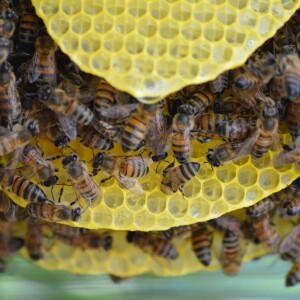Episodes

Thursday Jan 11, 2024
Episode 103: Hum of the Hive Retrospective - Part 2
Thursday Jan 11, 2024
Thursday Jan 11, 2024
In Part 2 of the Hum of the Hive retrospective, we’ve once again combined multiple (4) short segments together. So, make sure to listen to the end to hear them all! Hum of the Hive, featuring Linda Aydlett, follows the honeybee through the four seasons.
In the first segment, field bees are the focus of attention. Linda describes the various resources required by a hive to survive. To gather these resources, experienced foraging bees, also called scout bees, use a ‘waggle dance’ to communicate where the nectar or other resources can be found. Listening to this, you’ll appreciate why the field bees are the hardest working members of the hive.
Next, we shift to what happens to a honeybee colony in the spring. Many hives, that are running out of room, swarm to divide the colony. But this is not an impulsive decision. Many preparations are required to successfully accomplish this. The queen needs conditioning to be able to fly to a new location. Scout bees have to find potential places to relocate, and then use the waggle dance to communicate options. Once a favored location is selected, the colony flies off to its new home.
In the third segment, learn about propolis. Some resin honeybees collect resin from trees and shrubs and carry it back to the hive. Then, cementing bees remove the resin from the resin collecting bees and apply it to various uses within the hive. It can be used to seal cracks and crevices in preparation for the winter months, but resin also protects the colony from diseases, due to its multiple beneficial properties.
Finally, in the fourth segment, we shift to the summer months when water may be in short supply. This is called a dearth. Measures are taken to survive in difficult times. For example, they may limit the size of the colony by not allowing drones to return to the hive. Fewer bees mean fewer mouths to feed. They might also resort to cannibalism, or robbery to ensure the continuation of the colony. It can be tough to be a bee!
We welcome your feedback on the first or our retrospective series to help you find content on a specific topic in one place. E-mail us at colgremg@cornell.edu.


Comments (0)
To leave or reply to comments, please download free Podbean or
No Comments
To leave or reply to comments,
please download free Podbean App.